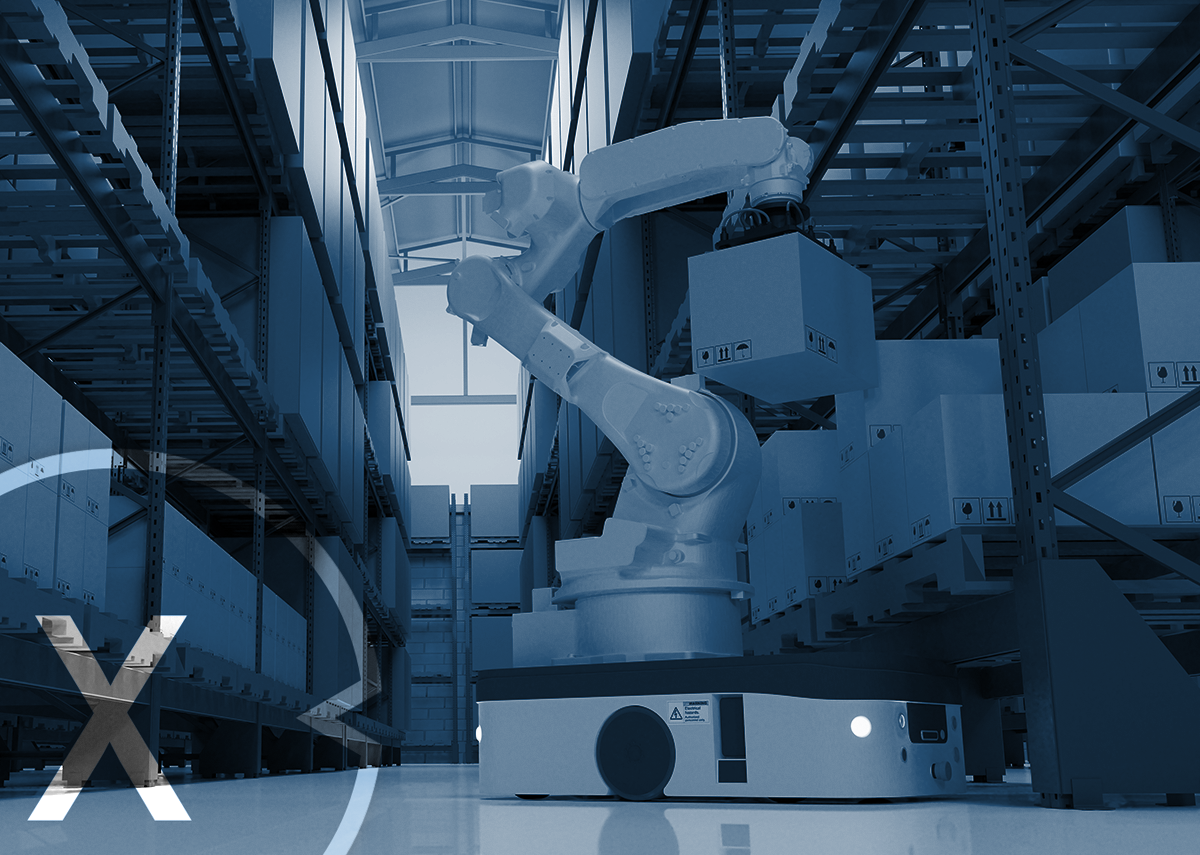
Smart & Intelligent Logistics Equipment – Automation & Component Solutions – Image: Xpert.Digital / August Phunitiphat|Shutterstock.com
Intelligent logistics equipment
In logistics, the technical term "smart logistics equipment" is often referred to as "smart logistics equipment" or "intelligent logistics equipment." These terms describe the use of technologies such as the Internet of Things (IoT), artificial intelligence (AI), and automation to make logistics processes more efficient, precise, and transparent. Examples of smart logistics equipment include networked sensors, automated sorting systems, autonomous vehicles, and warehouse robots.
Autonomous warehouse robots offer a multitude of advantages in intelligent logistics
These advantages make autonomous warehouse robots an attractive solution for companies that want to optimize their warehouse processes and become more competitive:
Increased efficiency
Autonomous warehouse robots can perform tasks such as picking, packing, and stacking goods faster and more accurately than human workers. This increases the efficiency of warehouse operations, leading to faster order processing and reduced delays.
Cost savings
By using autonomous warehouse robots, companies can reduce their operating costs. These robots work around the clock and require no breaks or overtime. This allows for reduced personnel costs and increased productivity.
Precision and error minimization
Human error in repetitive tasks is unavoidable. Autonomous warehouse robots, on the other hand, are programmed to perform tasks with high precision. This minimizes the risk of errors, such as incorrectly packed orders.
Space optimization
Warehouse robots can optimally utilize the available space in a warehouse. They are able to stack goods in a confined space and organize them efficiently. This allows for more effective use of storage space, resulting in higher storage capacity.
Security
Autonomous warehouse robots can be equipped with advanced safety systems to prevent collisions with people or other objects. This reduces the risk of workplace accidents and improves employee safety.
Real-time monitoring and data analysis
Intelligent warehouse robots can be equipped with sensors and IoT technologies that enable real-time monitoring of inventory and logistics processes. The collected data can be analyzed to identify bottlenecks, further improve efficiency, and make informed decisions.
Xpert.Plus warehouse optimization - high-bay warehouses such as pallet warehouses consulting and planning
Autonomous vehicles in intelligent logistics
Autonomous vehicles are a promising technology in intelligent logistics, helping companies improve their transport and delivery processes and increase their competitiveness.
Increased efficiency
Autonomous vehicles can accelerate and streamline logistics processes. They can automatically calculate the best route to a destination and bypass traffic jams or other obstacles. This reduces delivery times and improves the efficiency of the entire supply chain.
Cost savings
The use of autonomous vehicles can lead to significant cost savings. Since no human drivers are required, costs for labor, payroll taxes, and potential errors or accidents caused by human error are eliminated. Furthermore, autonomous vehicles can choose more efficient routes, optimize fuel consumption, and better plan maintenance, resulting in further cost savings.
Security
Autonomous vehicles can be equipped with advanced sensors, cameras, and AI systems that enable precise environmental perception. This allows them to detect obstacles early and avoid collisions. The automated driving functions minimize the risk of driver errors due to fatigue, distraction, or human error.
Flexibility and scalability
Autonomous vehicles enable more flexible and scalable logistics. They can be deployed in various sectors as needed, whether in road transport, warehouses, or airports. Companies can easily expand or reduce their fleets to meet current demands.
Data analysis and optimization
Autonomous vehicles generate a wealth of data about their performance, routes, and deliveries. This data can be analyzed to identify bottlenecks, improve efficiency, and make informed decisions regarding route planning, maintenance needs, and fleet management. Continuous data collection enables ongoing optimization of logistics processes.
environmental friendliness
Autonomous vehicles have the potential to reduce environmental impact. By optimizing routes and avoiding traffic jams, they can lower fuel consumption and reduce CO₂ emissions. Furthermore, autonomous vehicles enable the use of electric drive technology, leading to a further reduction in emissions.
Autonomous mobile robots. AMR technology. Self-driving carts sort goods in the warehouse – Image: Xpert.Digital / FOTOGRIN|Shutterstock.com
Automated sorting systems in intelligent logistics
Automated sorting systems are a valuable technology in intelligent logistics. They improve the efficiency, accuracy, and flexibility of sorting processes, ultimately leading to an optimized supply chain and a better customer experience.
Speed and efficiency
Automated sorting systems can sort a large number of packages or products in a very short time. Compared to manual sorting, they offer significantly higher speed and efficiency. This enables faster order processing and improved delivery times.
accuracy
Automated sorting reduces the risk of errors in assigning packages to the correct destinations. The systems use advanced technologies such as barcode scanning, optical recognition, or RFID to identify and sort products with high precision. This improves the accuracy of the sorting processes.
Scalability
Automated sorting systems are able to adapt to varying volumes and sorting requirements. They can easily scale to larger or smaller quantities of packages without requiring extensive system modifications. This allows companies to flexibly adjust their capacity and respond to changing needs.
Space optimization
The use of automated sorting systems allows for more efficient use of available space in warehouses or distribution centers. These systems can stack products in a very small space and optimize sorting processes. This leads to higher storage density and better space utilization.
Reduced workload
By automating sorting processes, companies can significantly reduce manual labor. This leads to less reliance on workers and allows resources to be deployed in other areas that require more expertise or specific tasks.
Transparency and traceability
Automated sorting systems enable improved transparency and traceability of shipments. Using technologies such as RFID tags or barcodes, packages can be tracked and their location recorded in real time. This allows for better shipment monitoring and more effective information provision to customers.
Autonomous Mobile Robots (AMR) in Intelligent Logistics
Autonomous Mobile Robots (AMRs) offer numerous advantages in intelligent logistics. These advantages make autonomous mobile robots a valuable technology in this field. They enable efficient and flexible material movement, improve safety, provide real-time monitoring, and allow for better utilization of available space. Overall, AMRs contribute to optimizing logistics processes and increasing productivity.
Flexibility and adaptability
AMRs are mobile robots that can move autonomously within an environment. They can easily adapt to different tasks and situations. Their programmable nature allows them to be used in various fields, including material handling, warehouse management, order picking, and much more.
Increased efficiency
AMRs can efficiently perform repetitive tasks while maintaining high speed and accuracy. They can automatically transport goods from one place to another, thereby increasing productivity and reducing bottlenecks in logistics processes.
Cost savings
The use of AMRs can lead to significant cost savings. They reduce the need for manual labor and the associated costs, as they can operate autonomously without human supervision. Furthermore, by optimizing routes and avoiding empty runs, they can reduce fuel consumption and further lower operating costs.
Security
AMRs are equipped with advanced safety features to prevent collisions with obstacles or people. They are fitted with sensors, cameras, and other technologies that enable accurate environmental perception. This allows them to navigate safely in environments with people and other vehicles.
Real-time monitoring and data analysis
AMRs can be connected to IoT technologies to enable real-time monitoring and communication. They can collect data about their location, condition, and task status and report it back to the logistics system. This data can be analyzed to identify bottlenecks, improve efficiency, and enable informed decision-making.
Space optimization
AMRs are able to optimally utilize the available space in a warehouse or production facility. They can navigate confined spaces while maximizing storage density. Through automated warehouse management and efficient transport of goods, they help reduce space requirements and improve space utilization.
Logistics consultant: Use our Xpert.Plus service for your logistics consulting, warehouse planning or warehouse consulting with automation & component solutions
Xpert.Plus is a project from Xpert.Digital. We have many years of experience in supporting and advising on storage solutions and in logistics optimization, which we bundle in a large network Xpert.Plus
I would be happy to serve as your personal advisor.
You can contact me by filling out the contact form below or simply call me on +49 89 89 674 804 (Munich) .
I'm looking forward to our joint project.
Xpert.Digital – Konrad Wolfenstein
Xpert.Digital is a hub for industry with a focus on digitalization, mechanical engineering, logistics/intralogistics and photovoltaics.
With our 360° business development solution, we support well-known companies from new business to after sales.
Market intelligence, smarketing, marketing automation, content development, PR, mail campaigns, personalized social media and lead nurturing are part of our digital tools.
You can find out more at: www.xpert.digital – www.xpert.solar – www.xpert.plus

